Following my interview earlier this year with Gregg Reyes, President and CEO of Reytec Construction Resources, Inc, I visited Steven Aranda near the Galleria area of Houston. Aranda is a Project Manager with the company, and he was happy to show me some of the projects Reytec has worked on in that area, and to explain how Reytec has grown in order to provide the various types of service their clients need.The area is part of the Uptown District, one of several Tax Increment Reinvestment Zones (TIRZs) in Houston. TIRZs are special zones created by the Houston City Council to attract new investment to specific areas within the city. Houston has several of these special tax zones, but not all of Houston falls into one of them. Within each of these zones, certain taxes are set-aside in a fund to finance public improvements within the boundaries of that zone.
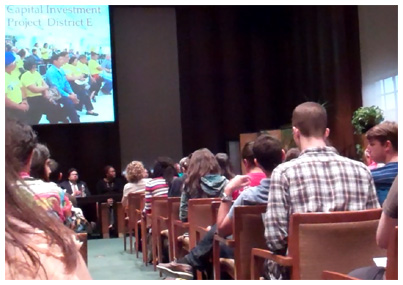

Last month a panel of civic leaders, employers, attorneys and workers participated in a forum discussion titled “Wage Theft – Its Impact on the Local Economy and in the Community”. The free event, hosted by Rice University’s Center for the Study of Women, Gender and Sexuality and by the Fey y Justica Worker’s Center (formerly the Houston Interfaith Worker Justice Center), was held on the 3rd floor of the Fondren Library at Rice University. The diverse panel offered different perspectives on how wage theft impacts the local Houston economy, responsible businesses, social programs, and the community as well as what can be done to eliminate this unethical practice.Simply put, wage theft is a practice in which employers cheat workers out of wages and benefits owed. According to Houston’s Down With Wage Theft Campaign:“Wage theft depresses family income and as a consequence limits spending, lowers business sales, leaves taxes unpaid, public services undermined and economic growth diminished..."
May 13, 2013


Florida legislators have made a bold move in the battle against payroll fraud with the passing of Florida House Bill 217 titled “Money Services Businesses”. Aimed directly at the bandits who run check cashing stores to enable dishonest contractors to avoid paying workers’ compensation and payroll taxes, the bill is now on its way to Governor Rick Scott for his signature into law. The details of the bill were explained in a press release from the Florida Office of Financial Regulation (OFR).“The new legislation will require check cashers to log any checks cashed in excess of $1,000. In addition to the check amount, each business will be required to submit traceable information such as payor, payee, fee charged, type of identification presented and payee’s workers’ compensation insurance policy number, if the check was made out to a business. The bill also provides that multiple checks accepted from any one person in one day, which total $1,000 or more, must be aggregated and reported in the database.”Readers of Construction Citizen have already been informed about how these check cashing store / workers’ comp fraud schemes work, but here it is again. A dishonest contractor will submit a bid for a job using a company name which lists only a few employees – just enough to obtain a small workers’ compensation policy. The contractor will then take checks paid to that company by the general contractor to a check cashing store to cash them so that most of the workers can be paid in cash.
May 08, 2013
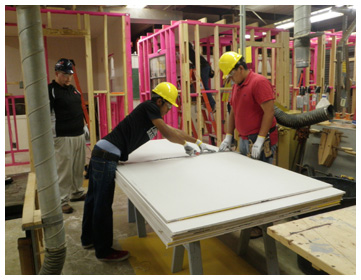

Last month some high school students attended a drywall installation clinic at Pasadena ISD’s L.P. Card Career and Technical Center led by a team from the Houston division of Marek Brothers Systems. The team from Marek – which included Saied Alavi, Terry Holcombe, Dave McMillan, Buddy Britt, and Aurelio Flores – gave a classroom presentation to the two dozen students in Pasadena, Texas before leading them in a hands-on workshop where they shared their experience and crafts knowledge with the students.Saied Alavi began with an introduction, giving a little background information about Marek Brothers Systems. He talked about the opportunities individuals coming out of high school can find at Marek, and the wage level and potential for career growth they could expect. He explained how those who stay with the company have opportunities to move up to become a supervisor, a foreman, or even a superintendent – it is up to each individual how far he or she can move up the company career ladder. He stated: “We don’t choose anyone by their height, by their size, by the color of their hair – it’s all based on your work. It’s an open race. Just as in track and field, when everybody lines up, it all depends on who runs the fastest. In Real Life it is the same way.
April 29, 2013


A federal grand jury in Kansas City, Kansas has charged a construction company, its owners, and four of its crew leaders with harboring illegal aliens and money laundering, charges which could bring the defendants up to 20 years in federal prison each and fines up to $250,000 per convicted count. Advantage Framing Systems, Inc. of Spring Hill, Kansas, company owners James and Kimberly Humbert and Charles Stevens II, and four framing crew leaders for the company – Jose Ramon Caro-Corral, Angel Arguello-Plata, Dennis Ericson Portillo and Jorge Uriel Delgado-Ovalle are all charged with committing these crimes as part of a scheme to hire illegal workers in order to gain a competitive advantage over other contractors and boost their own profits.A press release by the United States Attorney’s Office for the District of Kansas explained how the company allegedly conducted business:“The indictment alleges James Humbert, Kimberly Humbert, Charles Stevens and the company itself were responsible for hiring undocumented workers for the purpose of lowering the company’s operating costs. The wages the company paid did not include the employer’s share of Social Security payments, workers compensation, or unemployment insurance benefits paid to lawfully employed workers in the construction industry. They placed themselves at a competitive advantage to other builders who did not employ undocumented workers.
April 19, 2013
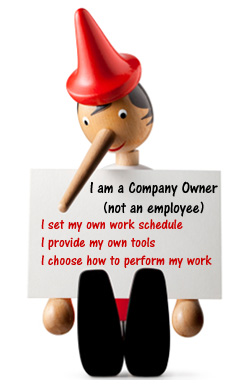

The state of Utah is fighting worker misclassification in the construction industry by scrutinizing employment records of companies who hire limited liability corporations, or LLCs. Some dishonest contractors avoid paying their workers as employees by having each of them register as separate LLCs, claiming on paper at least that each worker is a company owner or independent contractor.Two years ago the state legislature created an enforcement council consisting of representatives from the state’s Labor Commission, Department of Commerce, Tax Commission, Department of Workforce Services and the Utah attorney general. The council meets monthly to share information about construction companies in order to identify and stop worker misclassification, or payroll fraud. The 2013 legislature has now authorized the continuation of the Worker Classification Coordinated Enforcement Council for the next three years.The Utah Division of Occupational and Professional Licensing (DOPL) is in charge of enforcing state licensing rules for construction companies. This week, an article in the Salt Lake Tribune explained how these rules provide one way for contractors who commit payroll fraud to be caught. The article states:“Changes in 2011 tightened definitions of employees and owners for licensed construction companies, set new reporting rules and provided for state auditing to verify financial responsibility. Licensing disclosure rules give officials a crucial glimpse into how companies operate, as well as a squeeze point when their practices are out of bounds.”
March 27, 2013


Each year, architecture and design journal eVolo challenges designers to come up with creative ideas for building vertical living space. The entries are scored on their innovative use of current and future technologies which would provide living space which is both aesthetically pleasing and environmentally sustainable. The results often look like something dreamed up for a science fiction or fantasy movie.The results of the 2013 eVolo Skyscraper Competition have just been announced, with three named winners and 24 listed honorable mentions out of the 625 projects which were submitted from 83 countries across the world.The top three design winners as reported in their press release this week:“The first place was awarded to Derek Pirozzi from the United States, for his project "Polar Umbrella".
March 21, 2013
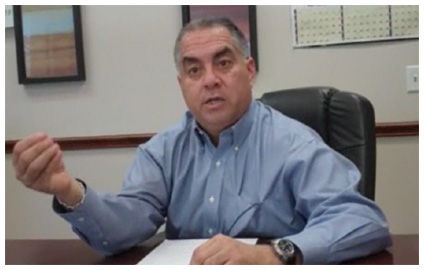

Earlier this year, I sat down with Gregg Reyes, President and CEO of Reytec Construction Resources, Inc., to learn about his company and how it grew from a two-person contracting company operating out of a private home to the go-to company for specialty concrete work which it has become today. Reytec is a provider of many types of concrete excavation and structural services, specializing in underground utility work, above ground paving and structures, and site preparation for both public and private projects.Reytec was started in 1997. At that time, Reytec was a general contracting company consisting of only Reyes and his wife, operating out of their home, and hiring subcontractors to help complete projects. While working on a restaurant project, Reyes met an older man who was running a concrete crew for one of the subcontractors Reyes had hired, and the two of them truly hit it off.
March 14, 2013
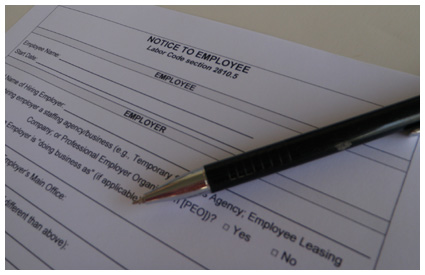

During September of 2010, Governor Arnold Schwarzenegger killed two bills aimed at penalizing employers who commit wage theft in California. However, he failed to win reelection, and after Governor Jerry Brown took over the post the following January, Brown went on to sign Assembly Bill 469, known as the Wage Theft Protection Act of 2011.California’s Wage Theft Protection Act (WTPA) has been in effect since January 2012. It added Section 2810.5 to the labor code which requires employers to provide new employees with specific information in writing at the time they are hired, including the legal name and address of the company who is hiring the new employee, the name and address of the company for whom the employee will perform work, the employee’s rate of pay, and the basis of wage payment
March 14, 2013
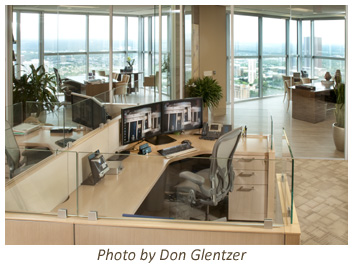

Just before the December holidays, I had the privilege of touring a job site at which Marek Brothers Systems, working closely with designers from Slovack-Bass, is providing a variety of work on a high-end commercial office remodel. Interestingly, I got to view both finished product and work in progress on the same day, because the job involves work on two separate floors for a banking firm’s corporate offices in Houston’s Williams Tower. The remodel of one floor had been completed, and was already being occupied by executives and staff of the company who ordered the work. Another floor showed how the remodel had looked at a much earlier stage. We were guided by Ron Assad from Marek and Lauren Lucas representing the owner.The interior design of the finished space features light colors and see-through glass walls to allow as much natural light to surround all the workspaces, and to keep the look of the offices open. This is partly to encourage collaborative work, but also makes the environment feel more like a comfortable and beautiful living space
February 20, 2013




